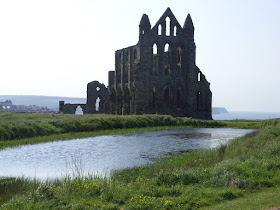





The magic lake of Lyn Y Fan Fach in the Brecon Beacons is surrounded by mountains known as the Carmarthen Fans, and when you get to the top of them you can see over the Black Mountains. It is very LOTR and it feels like most places in that area, as if you are alone on the planet. The romance of the lake has been spoiled slightly by its conversion into a reservoir, however the views are still amazing and it is an unforgettable experience to visit this place.
The legend of the Lady of the Lake associated with this place appears in the Mabinogian, the 10th century (?) anthology of Welsh folklore, but the story itself possibly pre-dates that of the Arthurian lady of the lake, as the water-fairy is a creature of ancient folklore. The story appears in many folklore anthologies notably George Basil Barham's excellent 1922 travel guide, Legend Land Volume 1: A Collection of Some of the Old Tales Told in Those Western Parts of Britain served by The Great Western Railway:
THE LADY OF LLYN-Y-FAN FACH
[29]
Not many miles from Llandovery, in the midst of glorious mountain scenery, is a lovely little lake known as Llyn-y-Fan-Fach, the scene of a very remarkable occurrence. Once upon a time a simple cowherd, eating his frugal meal by the edge of the water, observed with amazement, seated upon the calm surface of the lake, the most beautiful woman he had ever seen. So great was his admiration for her that he cried out, and she, turning to him, gave a rapturous smile and silently disappeared beneath the waters.
The peasant was distracted, for he had fallen deeply in love with the beautiful lady. He waited until dark, but she did not appear again; but at daybreak the next morning he returned once more, and was again rewarded by the sight of his enchantress and another of her alluring smiles.
Several times more he saw her and each time he besought her to be his wife, but she only smiled and disappeared, until at length one evening, just as the sun was setting, the beautiful lady appeared, and this time, instead of diving beneath the surface, she came to the shore, and, after some persuasion, consented to marry the youth. But she made one condition: if ever he should strike her three blows without cause she would leave him, she said, and their marriage would be at an end.
So the two were married happily and went to live at Esgair Laethdy, near Myddfai, the maiden bringing with her as dowry a large number of cattle and horses which she called up from the bottom of the lake.
[30]
For years the couple lived in great prosperity and happiness, and three handsome sons were born to them; then the day arrived when husband and wife were setting out for a christening, and, being rather late, the husband slapped his wife merrily on the shoulder, urging her to hurry. Sadly she reminded him that he had struck her the first of the causeless blows.
Years passed by, and the couple were at a wedding. In the midst of all the merry-making the wife burst suddenly into tears. Patting her sympathetically on the arm, the man inquired the cause of her weeping, and she, sobbing the harder, reminded him that he had struck her a second time.
Now that he had only one chance left, the husband was particularly careful never to forget and strike the third and last blow; but, after a long while, at a funeral one day, while all were sobbing and weeping, the beautiful lady suddenly began laughing merrily. Touching her gently to quiet her, the husband realised that the end had come.
"The last blow has been struck; our marriage is ended," said the wife, now in tears; and with that she started off across the hills to their farm. There she called together her cattle and other stock, which immediately obeyed her voice, and, led by the beautiful lady, the whole procession moved off across the mountains back to the lake.
Among the animals was a team of four oxen which were ploughing at the time. They followed, too, plough and all, and, they say, to this very day you may [31] see a well-marked furrow running right across the Myddfai mountain to the edge of Llyn-y-Fan-Fach, which proves the truth of this story.
The disconsolate husband never saw his lady again, but she used sometimes to appear to her sons, and she gave them such wonderful knowledge that all three became the most famous doctors in that part of Wales.
Llandovery, from which place you may visit the scenes of this legend, is a charming little town in East Carmarthenshire, situated in glorious surroundings of mountains, vale, and moorland, where some of the finest salmon and trout fishing in South Wales may be enjoyed. It stands in the beautiful Towy Valley, on a branch line which runs up into the mountain country from Llanelly. Llandovery is famous for its air, which is said to be the purest and most bracing in the district.

Published in 1922 by THE GREAT WESTERN RAILWAY
[FELIX J. C. POLE, GENERAL MANAGER]
PADDINGTON STATION, LONDON















































